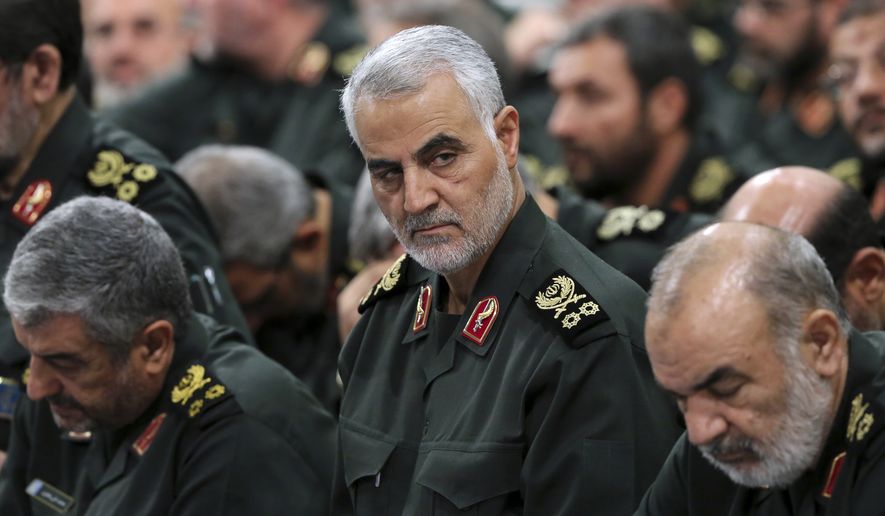Social media is wondering how the late Iranian Maj. Gen. Qassem Soleimani ended up in the 2015 U.S.-Iran nuclear deal as someone granted sanctions relief.
Soleimani, who led Iran’s terrorist Quds Force, was killed by a missile strike on Jan. 3 in Baghdad on orders from President Trump.
His name is among scores of companies and Iranians listed in the 2015 Joint Comprehensive Plan of Action (JCPOA) achieved by President Obama. Mr. Trump has ditched the deal and imposed a new round of economic sanctions that hinder Tehran’s ability to make bank transactions and conduct international trade.
The reason Soleimani’s name appears has more to do with European laws than with the U.S. and its sanctioning of him as a Specially Designated National (SDN), explains a former JCPOA architect.
In short, the notorious Soleimani was never and would never be granted freedom from U.S. sanctions, Richard Nephew, a Columbia University professor of international and public affairs, told The Washington Times.
Mr. Nephew has a rich resume of applying and evaluating the effects of economic sanctions while an official at the State Department during the George W. Bush and Obama administrations, and at the White House National Security Council in 2011-13. He served as the lead sanctions expert for the U.S. team negotiating JCPOA in 2013-14.
Mr. Nephew told The Times that Soleimani is listed in the agreement under European sanctions, not U.S. sanctions. The Europeans agreed to drop him because under their law every Iranian sanctioned was for nuclear proliferation reasons.
The U.S. employs a different system in which belligerents are sanctioned for a number of malign activities, such as Soleimani commanding the Quds Force.
“We have a completely different system, and Soleimani was not going to be removed as an SDN. Ever,” Mr. Nephew said. “As a practical matter, the fact that Soleimani would remain a U.S. SDN means that he would find his ability to operate abroad as limited the day before the Europeans removed him from their list as afterwards.”
The Soleimani-commanded Quds Force is Iran’s foreign operations branch that arms and trains proxy forces and militias, some of whom are designated terrorist groups.
The most vivid example is Soleimani tasking Quds operators to train and equip Shiite Iraqis to target and kill American troops in 2005-11 with explosive devices developed by Iran. The Pentagon said more than 600 service members were killed in Soleimani’s targeted war.
In April, Mr. Trump designated the Islamic Revolutionary Guard Corps (IRGC), Iran’s premier military and internal security force, which includes the Quds Force, as a terrorist organization. The administration said it marked the first time a government agency received the terrorist branding.
In 2007, the Bush administration designed the Quds Force as a terrorist group actively funding America’s lethal enemies and specifically sanctioned Soleimani.
“Through Quds Force material support to the Taliban, we believe Iran is seeking to inflict casualties on U.S. and NATO forces,” the statement said, singling out one of a dozen Quds-aided groups. “In addition, the Quds Force provides lethal support in the form of weapons, training, funding, and guidance to select groups of Iraqi Shi’a militants who target and kill Coalition and Iraqi forces and innocent Iraqi civilians.”
In a 2018 speech in Iran, Soleimani mocked Mr. Trump as the president was upping his anti-Iran rhetoric.
“Not a night goes by when we don’t think about you in our sleep,” Soleimani said, according to the Middle East Media Research Institute. “Let me tell you, Mr. Trump the gambler Let me tell you Know that we are near you, in places that don’t come to your mind. We are near you in places that you can’t even imagine. We are a nation of martyrdom.”
That same month, Secretary of State Mike Pompeo said at the Ronald Reagan Presidential Library on countering Iran: “There’s more to come. Regime leaders, especially those at the top of the IRGC and the Quds Force like Qassem Soleimani, must be made to feel painful consequences of their bad decision making.”
• Rowan Scarborough can be reached at rscarborough@washingtontimes.com.




Please read our comment policy before commenting.